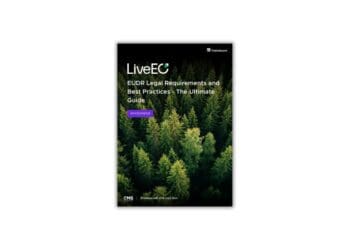Demand for ESG-aligned asset management has induced many advisors to take the Net Zero Asset Managers Initiative (NZAMI) Commitment. Lance Dial and Miranda Lindl O’Connell argue, however, that making this pledge calls for careful planning and consideration of fiduciary duties.
Many asset managers are signing up for the Net Zero Asset Managers Initiative (NZAMI), a commitment to support the goal of net-zero greenhouse gas emissions by 2050 (the NZAMI Commitment). While the NZAMI Commitment itself is straightforward, its implementation can create unanticipated complexities, especially for asset managers with large existing books of business or that do not have existing environmental, social, and governance (ESG) product offerings. These complexities range across the asset manager’s business, raising issues with respect to fiduciary duties, disclosure documents, portfolio management processes, advertising and marketing, guideline monitoring, client reporting, issuer engagement, and proxy voting, among other considerations.
The NZAMI Commitment – Background
The NZAMI Commitment provides a framework under which asset managers will seek to ultimately achieve 100% of their assets under management in strategies that support the overall goal of obtaining net-zero greenhouse gas emissions by 2050 or sooner. Critically, this commitment is for asset managers to promote the benefits of net-zero investing to their clients and prospects, and is not an obligation to change any existing strategies. Asset managers can realize their commitment by engaging with clients and prospects on the benefits of net-zero investing, developing new investment products aligned with net-zero investing, building tools to ensure portfolio managers can implement net-zero investment policies, and creating net-zero–oriented client reporting metrics. But prior to making the NZAMI Commitment, asset managers should consider some key fiduciary and regulatory issues that require significant coordination across their firms.
NZAMI Commitment Challenges
Fiduciary Issues
Asset managers generally owe a fiduciary duty to their clients requiring them to place their clients’ interests above their own. The NZAMI Commitment creates a new potential conflict here, in the sense that an asset manager making the NZAMI Commitment has an interest to maximize the assets aligned with its commitment (i.e., to ultimately achieve 100% of its assets under management in Net Zero Strategies), whereas not all of the asset manager’s clients may have the same interest (e.g., Net Zero Strategies may or may not be aligned with a client’s investment objectives).
This conflict does not directly impact asset managers that are developing new Net Zero Strategies because there are no existing clients to whom the asset manager would owe a fiduciary duty. It would, however, be an acute consideration for asset managers who are considering modifying existing strategies to become Net Zero Strategies. Managing this conflict of interest requires that any existing clients are informed of any material changes to their strategies and, in some cases, provide consent to these changes through amendments to investment management agreements and/or investment guidelines. In the context of funds, addressing this conflict requires obtaining the consent of the fund’s fiduciary (e.g., a board of trustees) and, if necessary, making revisions to fund offering documents.
Identification of Net Zero Strategies
Part of the NZAMI Commitment requires asset managers to report the assets they manage in Net Zero Strategies, which requires an assessment of which of the asset manager’s strategies are Net Zero Strategies. There are no specific mandatory requirements for a Net Zero Strategy, so asset managers making this commitment should review their strategies in light of the overall objective to have a portfolio in line with the attainment of net-zero emissions by 2050 or sooner.
There are several paths through which a strategy may be determined to be a Net Zero Strategy. While some strategies may clearly qualify as Net Zero Strategies because they have adopted net zero–related investment objectives (e.g., an alternative energy strategy or environmental impact strategy), other strategies with more traditional investment objectives may also qualify without any modifications. For example, an energy strategy could be naturally consistent with net-zero management if the asset manager believes that the energy industry as a whole (or at least the portion in which the asset manager invests) is on a transition path to net-zero emissions by 2050. In addition, an asset manager may also conclude that the firm’s engagement with issuer management teams on carbon emissions reductions is sufficient to meet a net-zero commitment for a set of the firm’s strategies. With respect to other strategies, asset managers may determine to make modifications or impose new investment restrictions to support their qualification as Net Zero Strategies. Asset managers should bear in mind that, as noted above, the NZAMI Commitment is not an obligation to manage any particular assets toward net zero, but rather a commitment to build the capabilities to support and promote net-zero investing to their clients.
In any case, asset managers making the NZAMI Commitment should develop clear criteria for determining how a strategy would qualify to be considered a Net Zero Strategy and document the rationale for why these criteria meet the NZAMI Commitment. Where existing strategies are being included as Net Zero Strategies, asset managers should ensure that any changes to such strategies are made consistent with their fiduciary obligations regarding disclosure and consent, and that such designation does not conflict with any preexisting disclosures or marketing materials.
Portfolio Management Issues
Depending on the specific strategy involved, implementation of net-zero investing may require new data and systems for portfolio managers and guideline-monitoring teams. For example, in order to comply with a new guideline limiting a portfolio’s weighted average carbon intensity, a portfolio manager may require data showing carbon intensity at an issuer, industry, or sector level. Guideline-monitoring and compliance teams will also require the same data to confirm that the portfolio is being managed as intended.
Unfortunately, the market for reliable data regarding many climate-related metrics is still developing, so the availability of data may limit asset managers from implementing certain types of strategies. Where external vendor data is available, asset managers should understand how the data is generated, the material assumptions made by the vendor, and any material limitations or gaps in coverage. These assumptions, limitations, and gaps may create risks that the portfolio will fail to meet a net-zero objective.
Asset managers may also employ internal research to evaluate potential investments to implement Net Zero Strategies. In these cases, asset managers should ensure that the processes under which their research is generated are documented and performed independently from portfolio management functions, especially where the internal research underpins the compliance process with respect to investment restrictions. This independence is critical to ensure that the internal research is not influenced by an investment thesis.
Client Reporting Challenges
In addition to traditional client reporting, the NZAMI Commitment requires asset managers to develop new net-zero reporting for clients and for the public. Clients invested in Net Zero Strategies may expect more information regarding the emissions characteristics of their investments. As a result, asset managers may be required to develop new reporting templates and acquire new data about portfolio issuers to meet these needs. The limited availability of data may also be a limiting factor for certain reporting.
Investment Stewardship Challenges – Proxy Voting and Engagement
The NZAMI Commitment also requires asset managers to “implement a stewardship and engagement strategy, with a clear escalation and voting policy, that is consistent with our ambition for all assets under management to achieve net zero emissions by 2050 or sooner.” This component of the NZAMI Commitment is applicable to all assets managed by the asset manager, not just assets in Net Zero Strategies.
In assessing how to fulfill this portion of the commitment, managers should ensure that their engagement strategies remain in the best interests of all of their clients to ensure that they continue to meet their fiduciary obligations. For example, an issuer adopting an aggressive decarbonization plan may be important from a net-zero perspective. But if that plan required the issuer to take on increased business risk, it may not be in the interests of an asset manager’s clients – who are not invested in a net-zero–oriented strategy to support or promote that level of decarbonization. Asset managers making the NZAMI Commitment will need to review their stewardship, engagement and proxy voting practices to ensure that they can meet the terms of the NZAMI Commitment while also meeting their fiduciary obligations to all clients.
Meeting the NZAMI Challenges – Planning and Policies
Set a Strategic Plan
Given the variety of stakeholders and areas of an asset manager’s business that can be impacted by the NZAMI Commitment, asset managers seeking to make the NZAMI Commitment should first develop a strategic plan based on the asset manager’s current business, including its existing and prospective client base, investment capabilities, and existing investment products. For example, will Net Zero Strategies be broadly marketed to new investors or will the focus be on existing investors? Or both? Similarly, will the asset manager pursue its commitment through new products or adjustments to existing products? Or both? Does the asset manager have existing capabilities and expertise to effectively manage Net Zero Strategies, or will it need to build or otherwise acquire them? How will the asset manager incorporate engagement and proxy voting into its overall commitment?
This strategic plan will bring into focus any areas where the asset manager may need to invest in order to comply with the NZAMI Commitment. For example, managers seeking to evolve existing strategies will need a client communication plan, managers who are creating new products may need to acquire new data sources and develop new guideline-monitoring tests, and managers who engage with issuers as part of their NZAMI Commitment may need to revise their proxy-voting and engagement policies.
Develop a NZAMI Commitment Policy
Asset managers making the NZAMI Commitment should also adopt a NZAMI Commitment policy covering the specific requirements of the NZAMI Commitment, including, for example, publishing the disclosures required under the Task Force on Climate-Related Disclosures framework, making the required disclosures to the investor agenda, and providing reporting to clients.
In addition, the NZAMI Commitment policy can document the interpretations made by the asset manager in accordance with its strategic plan, such as the methodology for determining how strategies qualify as Net Zero Strategies as well as the procedures the asset manager follows to validate that its Net Zero Strategies are managed consistent with the NZAMI Commitment.
Conclusion
The implementation of the NZAMI Commitment is a complex and multifaceted undertaking, involving many areas of an asset manager’s operations, from portfolio management to marketing to client reporting. It can impact many of the asset manager’s stakeholders, including existing clients. Managers seeking to make the NZAMI Commitment can successfully navigate the various needs of each of their stakeholders by establishing and executing a strategic plan and developing and implementing a NZAMI Commitment policy.
This article is republished with permission from Morgan Lewis.



 Lance Dial is a partner at Morgan Lewis in the firm’s Boston office. With more than a decade of experience as senior in-house counsel with global investment managers, Lance has a deep understanding of mutual fund law and operation and is fluent in the myriad regulations applicable to investment managers. He is well versed in the creation of investment products and ESG and sustainability matters. Lance works extensively on regulatory policy matters engaging with various financial services regulators, including the US Securities and Exchange Commission, US Department of Labor, Internal Revenue Service, and US Department of Treasury.
Lance Dial is a partner at Morgan Lewis in the firm’s Boston office. With more than a decade of experience as senior in-house counsel with global investment managers, Lance has a deep understanding of mutual fund law and operation and is fluent in the myriad regulations applicable to investment managers. He is well versed in the creation of investment products and ESG and sustainability matters. Lance works extensively on regulatory policy matters engaging with various financial services regulators, including the US Securities and Exchange Commission, US Department of Labor, Internal Revenue Service, and US Department of Treasury.
 Miranda Lindl O’Connell is a private investment fund partner at Morgan Lewis, where she is co-leader of the ESG & Sustainability working group and office managing partner of the firm's San Francisco office. Her practice focuses on fund formation and investor side representation for clients such as fund of funds, private foundations, public charities, family offices, social impact entrepreneurs, pension plans and other institutional investors in a variety of structures including private equity funds, co-investment funds, venture funds, captive funds, separate accounts and other customized private finance options. Miranda advises social impact entrepreneurs, private foundations, and public charities on a range of social impact investments including program-related investments, mission-related investments, and innovative investment vehicles and structures including social impact funds and debt and equity investments.
Miranda Lindl O’Connell is a private investment fund partner at Morgan Lewis, where she is co-leader of the ESG & Sustainability working group and office managing partner of the firm's San Francisco office. Her practice focuses on fund formation and investor side representation for clients such as fund of funds, private foundations, public charities, family offices, social impact entrepreneurs, pension plans and other institutional investors in a variety of structures including private equity funds, co-investment funds, venture funds, captive funds, separate accounts and other customized private finance options. Miranda advises social impact entrepreneurs, private foundations, and public charities on a range of social impact investments including program-related investments, mission-related investments, and innovative investment vehicles and structures including social impact funds and debt and equity investments.









